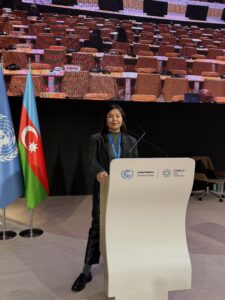There is something surreal about attending a global climate event like COP29. One day, you are reporting on the massive floods that hit your home country, Kazakhstan, resulting from climate change. A few months later, you are elbow-to-elbow with world leaders and policymakers who negotiate billion-dollar pledges for climate finance. And when you are in a city like Baku, where oil wealth screams through modern skyscrapers and fashionable streets, the contradictions hit even harder.

Assel Satubaldina, senior editor at The Astana Times. Photo credit: Assel Satubaldina
COP29, officially known as the United Nations Climate Change Conference, has been my first global event of such scale. The two-week conference gathered more than 70,000 delegates from nearly 200 countries. The high-level segment – the World Leaders Climate Action Summit – convened nearly 80 leaders, including President Kassym-Jomart Tokayev. He was the first to address the high-level forum outlining Kazakhstan’s climate agenda.
I could not help but feel the excitement of becoming part of such a global event and bringing Kazakhstan’s perspective to the table. But as exciting as it was, attending this climate summit also came with its challenges—starting with just getting to the venue – the Olympic Stadium.
The first morning of the conference, I left the hotel armed with a map on the phone and what I thought was a good sense of direction. Wrong. I sat in the wrong metro direction. Overall, it took me two days to figure out how to commute to the stadium. The venue was far enough and required a mix of public transport and some walking. Buses and metros were packed with the delegates (who were easy to recognize because of their bright blue badges) and locals, who seemed confused about the crowds.
Thankfully, the organizers provided free transport to registered attendees. It was such a relief to know that I could hop on a designated COP shuttle and not worry about ticket machines. It is a very thoughtful detail that makes an exhausting day just a little easier to handle.
However, neither the difficulties in commuting nor the rainy weather on all days of the first week spoiled the event’s energy. The level of organization – from passing security to volunteers always ready to help – was excellent.
The conference halls were a whirlwind of activity. Delegates in suits looking all serious, activists with big banners and people like me—journalists – who tried to make sense of it all. The scale of the venue itself (a stadium designed for 78,000 seats) amazed me but made my legs sore and feel like I ran a marathon every day, moving from the media center to the pavilion space where I had all of my interviews done.
On top of that, I was in awe of the pace and the number of side events and sessions in the pavilion space. A profound realization came to me that climate change is no longer just an environmental issue, as it concerns every aspect of our lives – from the food we eat, the water we drink, the energy that keeps our homes warm and bright, and the jobs we rely on.
I was also sure that climate action does not happen only on top. While money is vital to help countries mitigate and adapt, and the world needs trillions of dollars for that, climate action starts with each of us – from habits, decisions, and mindsets we adopt every day. Start with turning to sustainable products and reducing your waste!
As in every conference, there were plenty of official announcements, agreements, or polished promises. As much as I am an optimist, harsh reality, including that of my region, is always on my mind. The gap between promises and implementation remains yawning. There is doubt about the feasibility of every ambitious target set.
Like every big city, Baku is a perfect illustration of this gap. The grand architecture, the modern Flame Towers on the skyline, and perfectly clean parks, but in some neighborhoods farther, there is a different reality. This is a metaphor for the summit. While we all have the same journey toward climate action, we are starting from different realities. Rich countries are discussing how many billions they can allocate, and smaller countries, most impacted by climate change, are fighting for their very survival. It was like we were all traveling to the same destination, but some were riding in first class while others barely had a seat in the back.
This journey has many layers – stories of big promises and under-delivering. It is messy and sometimes disheartening. By the end of COP29, I wasn’t sure if I felt more inspired. But I was sure about the genuine connections happening and stories being shared that don’t make headlines.
Behind all of this effort are real people with real problems fighting for a future. And maybe that’s enough to keep the conversation going.
I know the world has never been an easy place – wars, pandemics, and economic crises. Climate change is universal to all. As one of the people I came across at the conference said, if the world can find money to fund the war, it can surely pool resources to heal the planet and ensure we all have a future. The hope is that the negotiators will reach an agreement.
Oh, and one tip: if you ever find yourself in Baku, try the Baku baklava. Trust me on this one.
